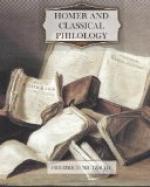hypothesis that, in the strictest sense, the personality
of Homer is treated seriously; that a certain standard
of inner harmony is everywhere presupposed in the
manifestations of the personality; and that, with these
two excellent auxiliary hypotheses, whatever is seen
to be below this standard and opposed to this inner
harmony is at once swept aside as un-Homeric.
But even this distinguishing characteristic, in place
of wishing to recognise the supernatural existence
of a tangible personality, ascends likewise through
all the stages that lead to that zenith, with ever-increasing
energy and clearness. Individuality is ever more
strongly felt and accentuated; the psychological possibility
of a
single Homer is ever more forcibly demanded.
If we descend backwards from this zenith, step by
step, we find a guide to the understanding of the
Homeric problem in the person of Aristotle. Homer
was for him the flawless and untiring artist who knew
his end and the means to attain it; but there is still
a trace of infantile criticism to be found in Aristotle—i.e.,
in the naive concession he made to the public opinion
that considered Homer as the author of the original
of all comic epics, the
Margites. If we
go still further backwards from Aristotle, the inability
to create a personality is seen to increase; more and
more poems are attributed to Homer; and every period
lets us see its degree of criticism by how much and
what it considers as Homeric. In this backward
examination, we instinctively feel that away beyond
Herodotus there lies a period in which an immense
flood of great epics has been identified with the
name of Homer.
Let us imagine ourselves as living in the time of
Pisistratus: the word “Homer” then
comprehended an abundance of dissimilarities.
What was meant by “Homer” at that time?
It is evident that that generation found itself unable
to grasp a personality and the limits of its manifestations.
Homer had now become of small consequence. And
then we meet with the weighty question: What
lies before this period? Has Homer’s personality,
because it cannot be grasped, gradually faded away
into an empty name? Or had all the Homeric poems
been gathered together in a body, the nation naively
representing itself by the figure of Homer? Was
the person created out of a conception, or the conception
out of a person? This is the real “Homeric
question,” the central problem of the personality.
The difficulty of answering this question, however,
is increased when we seek a reply in another direction,
from the standpoint of the poems themselves which
have come down to us. As it is difficult for us
at the present day, and necessitates a serious effort
on our part, to understand the law of gravitation
clearly—that the earth alters its form
of motion when another heavenly body changes its position
in space, although no material connection unites one
to the other—it likewise costs us some
trouble to obtain a clear impression of that wonderful




